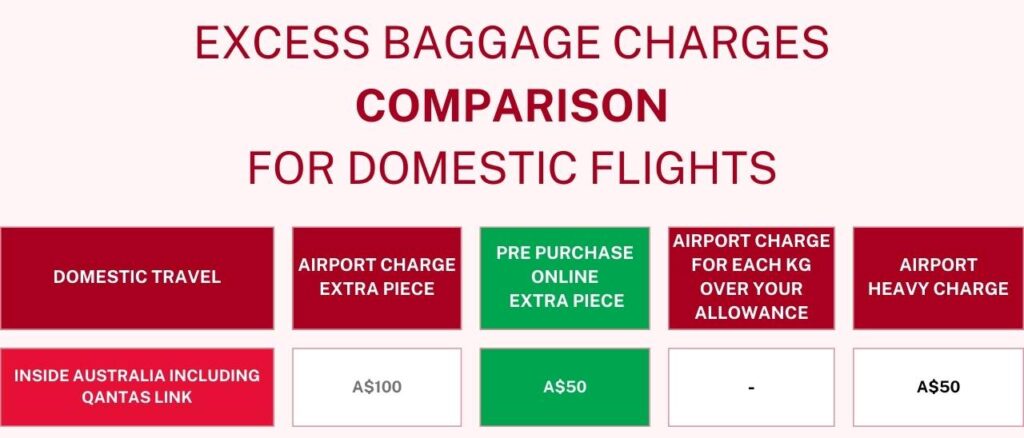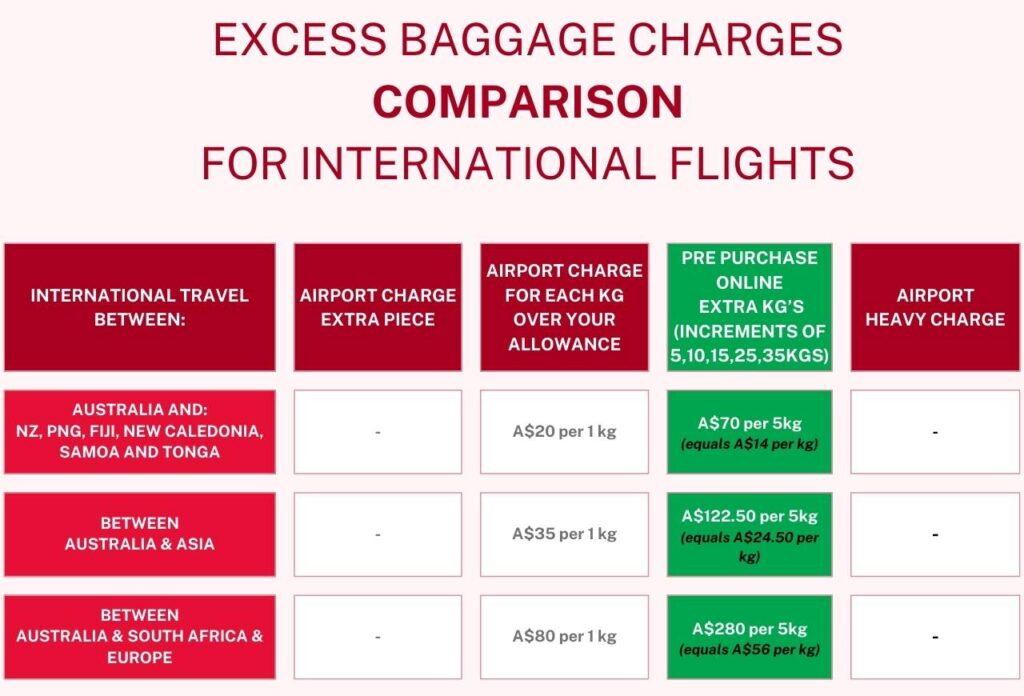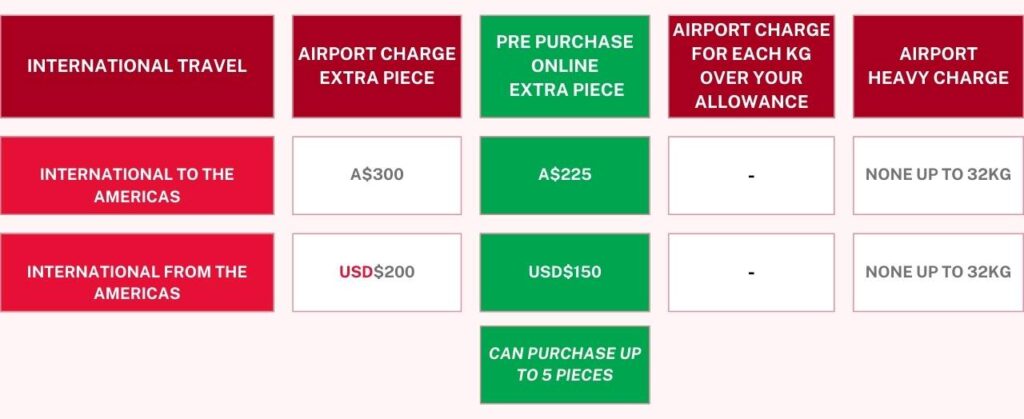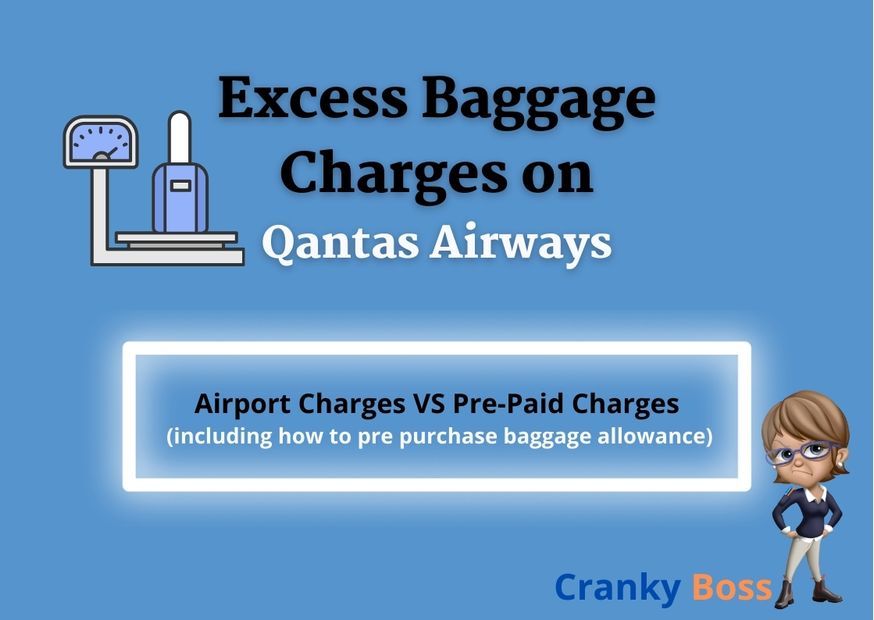Traveling involves careful planning, from choosing the right destination to booking flights and accommodations. One crucial aspect that often catches travellers off guard is baggage allowance – the predetermined weight and quantity limits set by airlines. Baggage allowance policies play a vital role in ensuring a smooth and efficient travel experience for both passengers and airlines.
Before we look at the rates that Qantas charges for excess baggage, let’s take a look at why baggage rules exist to begin with.
Understanding Baggage Allowance
Baggage allowance refers to the specific weight and quantity of luggage that passengers are permitted to bring on board an airline, encompassing both checked and carry-on items. Airlines implement baggage allowances for several reasons:
- Safety and Efficiency: Adhering to weight limits ensures that aircraft remain within their designated weight capacities, contributing to the overall safety and efficiency of flights.
- Cost Management: Airlines use baggage allowances to manage costs associated with fuel consumption. By controlling the total weight on the plane, they can optimize fuel efficiency.
- Fair Allocation: Baggage allowances help distribute space and weight fairly among all passengers, preventing overcrowding in the cabin and ensuring everyone has access to essential storage areas.
- Streamlined Operations: Clear baggage policies streamline airport operations, making check-in, security checks, and boarding processes more efficient.
What are the charges for excess baggage with Qantas?
Depending on destination, international excess baggage charges at the airport with Qantas can start at $20 per kg and can go up to $80 per kg.
If you pre purchase it will start around $14 per kg and get to $56 per kg.
The following table will show you what the cost of excess baggage would be when showing up to the airport without pre purchasing and it also illustrates the substantial savings that can be achieved by planning and securing extra baggage before reaching the airport.
Navigate below to either Domestic or International Travel and compare the charges. One is the airport charge and the other a pre purchase charge. It can be 50% less in some cases. That’s significant.
Domestic Flights Qantas Excess Baggage Charges Per Piece.
In domestic flights, Qantas charges per piece rather than per kilo as seen below. Note the Airport Heavy Charge as well. You will be charged this if your luggage exceeds 23 Kgs in weight unless you are Qantas Platinum, Gold, Silver and Qantas Club Member or travelling Business Class.

International Flights Qantas Excess Baggage Charges Per KG.
In international flights, with the exception of the Americas, Qantas charges per kilo rather than per piece as seen below.

International Flights – (to and from Americas) Qantas Excess Baggage Charges Per Piece.
In the international flights of the Americas only, Qantas charges per piece rather than per kilo as seen below.

Important Details to Keep in Mind
If you anticipate that your luggage might surpass the standard checked baggage limits, consider securing an extra baggage allowance online for more economical rates compared to those charged at the airport.
Take note of the following key information regarding additional baggage allowances for Qantas flights:
- Applicable exclusively to Qantas-operated flights.
- Qantas Frequent Flyers can use Qantas Points for the purchase of additional baggage.
- Excess baggage charges will be levied at the airport for any luggage exceeding the designated allowance.
- For flights to/from North and South America, the checked baggage allowance is 32kg per piece. There is no heavy charge for pieces exceeding this weight limit. However, a heavy charge does apply to Australian domestic itineraries.
- You can include extra baggage during your flight booking or visit the “manage booking” section after confirming your flight to make the additional baggage purchase.
- For weight-based baggage allowances, you have the option to purchase up to 35kgs per transaction, with a maximum limit of 100kgs.
In the case of piece-based allowances, you can acquire up to 5 additional pieces of baggage.

Key Information
- Check Your Allowance: It’s crucial to be aware of your designated baggage allowance. Whether you’re a frequent traveller on a reward ticket or a first-time flyer, knowing your limits can help you avoid unexpected charges. You will generally find this on your ticket. Your confirmation emails should also state your baggage allowance.
- Weight Limit for Individual Pieces: Regardless of your allowance, no single piece of baggage should exceed 32KGS. If you find yourself nearing this limit, consider splitting your belongings into multiple pieces.
- Charges by Piece or Weight: Excess baggage charges can be applied either per additional piece or per extra kilogram. Understanding the charging mechanism helps you plan accordingly.
- Currency Consideration: Note that the currency for excess baggage charges is in AUD (Australian Dollars), but it may default to the local currency if the origin of the flight is outside of Australia. Be aware of the currency used to avoid any confusion during transactions.
What if my luggage is 1 kg overweight?
I can tell you that I was made to pull out 1 kg from my suitcase that reached 33 kgs. On a bleisure trip last year, I was travelling business class and understood my allowance to be 40 kgs. It was, but it had to be split into 2 pieces of no more than 32kgs each. I had no other extra bags with me so I had to tag my hiking boots over my shoulder for the whole journey. Lesson learnt!
Should I Pre-Purchase Additional Baggage Allowance?
Yes you should!
Benefits of Pre-Purchasing Additional Baggage Allowance
- Cost Savings: Pre-purchasing additional baggage allowance often comes at a lower cost compared to paying for excess baggage at the airport. Airlines typically offer discounted rates for pre-purchased allowances.
- Budgeting and Planning: Pre-purchasing allows passengers to plan and budget their travel expenses more effectively. Knowing the cost in advance helps travellers avoid last-minute surprises at the airport.
- Convenience: Managing baggage in advance through pre-purchase is a convenient option. It can be done online through the airline’s website or app, providing a streamlined process for travellers.
- Avoiding Airport Hassles: By pre-purchasing, passengers can avoid the hassle of dealing with excess baggage charges at the airport. This can save time and reduce stress during check-in and security checks. This is especially important for travellers who already suffer from travel anxiety.
- Peace of Mind: Knowing that your baggage is accounted for and paid for in advance provides peace of mind during your journey. It eliminates uncertainties related to baggage fees and potential last-minute adjustments. If you are a family travelling with kids, you would want to have things like this sorted out before getting to the airport. It’s going to save a lot of stress and last minute scrambling.
In summary, if you haven’t yet mastered the art of packing light and are carrying with you luggage that needs to be checked in, then pre-purchasing additional baggage allowance is a proactive and cost-effective approach that offers various benefits, including financial savings, convenience, and a more seamless travel experience.
Remember that baggage allowances can vary based on factors such as travel class, destination, and frequent flyer status. Additionally, policies may change, so it’s essential to verify the most up-to-date information by visiting the Qantas official website.

